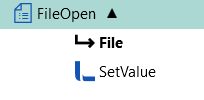FileOpen
FileOpen keeps a file open for speeding up large numbers of write operations.
This function creates a FileHandle object in its execution path that can be used by the TextFileWrite or BinaryFileWrite functions to write to the opened file.
You can also use the SetValue function to assign values to the FileHandle's 'Append' property to add content that way. See the examples below.
Properties
File path
The full path to the file that has to be kept open for writing.
Is text
Indicate if the file to open (or create) is a text file.
Codepage
Only displayed if the Is Text property option is checked.
Selects the character encoding to use when writing text to the file.
The default Codepage is the codepage used in your operating system.
File does not exist
You can opt to create the file or return an error if the file already exists.
File exists
Only displayed if the Is Text property option is checked.
What to do If the file already exists.
Options:
Append data will cause that any text that is written to the file is added to the end of that file.
Increment file name will add a number to the file name to make that name unique. This is a sequential number starting with 1.
Overwrite file will replace all content in the file with the new content.
Throw exception will stop the Function's processing and return an error.
Examples
Suppose you have a long list of lines of text to write to a file. Using the FileOpen function as shown below will run much quicker than doing it without the FileOpen function.
Use with TextFileWrite
Set the 'File path' property of the TextFileWrite function to 'FileOpen.File.FileHandle'.

Use with SetValue
Set the 'Target' property of the SetValue function to 'FileOpen.File.FileHandle.Append' or 'FileOpen.File.FileHandle.AppendLine'. 'AppendLine' will add a line-terminator after the text.

